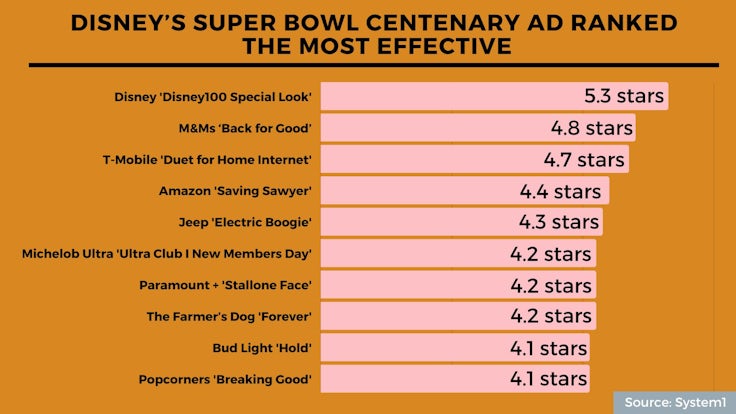Super Bowl ad winners, brand Britain, marketing’s value: 5 interesting stats to start your week
We arm you with all the numbers you need to tackle the week ahead.
 Disney’s Super Bowl centenary ad ranked the most effective
Disney’s Super Bowl centenary ad ranked the most effective
Disney’s 100-year anniversary advert has been ranked the most effective of last night’s Super Bowl by System1.
System1’s Test Your Ad platform forecasts the long- and short-term commercial effectiveness of adverts by recording viewers’ emotional responses. Based on the responses it assigns ads a star rating from 1.0 to 5.9, which indicates the ad’s ability to grow market share.
Disney’s Super Bowl ad, which featured famous faces and moments from its 100-year history, scored 5.3 stars. Usually, just 1% of ads score five stars or more.
The second-highest scoring ad of the night was M&Ms’ ‘Back for Good’. It almost broke the five-star barrier, scoring 4.8 on System1’s effectiveness scale. This ad was M&M’s second of the night and saw the return of its “spokescandies” brand characters who revealed their revival, having seemingly been put “on pause” in the first ad.
Rounding off the top three was T-Mobile’s ad, which scored 4.7 stars. This saw John Travolta update his famous Summer Nights performance to sing the praises of the brand’s broadband. He was joined by actors Zach Braff and Donald Faison.
On average, this year’s Super Bowl ads scored better on System1’s effectiveness ratings than last year’s. The average score across all this year’s ads was 3.0. Last year, no ads scored five stars or more, and the average score was 2.6 stars.
The rest of this year’s top 10 incudes Amazon’s ‘Saving Sawyer’, with a score of 4.4 stars, Jeep’s ‘Electric Boogie (4.3 stars), Michelob Ultra’s ‘Ultra Club I New Members Day’ (4.2 stars), ‘Stallone Face’ from Paramount+ (4.2 stars), dog food brand The Farmer’s Dog ‘Forever’ spot (4.2 stars), Bud Light’s ‘Hold’ (4.1 stars) and snack brand Popcorners’ ‘Breaking Good’ (4.1 stars).
Source: System1
Less than one in 10 Brits feel ‘proud’ to be British
 Less than one in 10 British people feel “proud” of their nationality, suggesting the UK’s brand needs a serious refresh.
Less than one in 10 British people feel “proud” of their nationality, suggesting the UK’s brand needs a serious refresh.
Instead the top feelings associated with being British are sad (42%), anxious (39%) and angry (31%).
Traditional and stereotypical British tropes are the dominant associations people in the UK still hold. The Royal Family (72%) was the motif most British people associated with the country, followed by the weather (60%) and food such as fish and chips (48%).
While the UK has one of the world’s largest creative industry sectors globally and consistently achieves a higher than average global innovation ranking, just one in five Britons agree their country is “innovative”.
The research also finds the UK lacks a unifying national value. In the US, more than nine in 10 say belief in individual freedoms is important to being “truly American”. By contrast, the most common value which emerges among British respondents is “democracy”; however, less than half (48%) cited this. Tolerance (37%) and the rule of law (36%) also emerge as top British values among survey respondents.
“We’re suffering a cultural hangover, living in the shadow of former glories. Little surprise then that the equity in our nation brand is fading – a brand that urgently needs rejuvenating,” says CPB chief strategy officer David Proudlock.
Source: CPB London
One third of marketing budgets spent on operational excellence
 Nearly one third (31%) of marketing budgets are spent on the pursuit of operational excellence, despite its inconsistent impact on business performance.
Nearly one third (31%) of marketing budgets are spent on the pursuit of operational excellence, despite its inconsistent impact on business performance.
Indeed, 72% of operational excellence activities don’t demonstrate characteristics that align with success.
The research finds companies with ‘strong pursuits’ of operational excellence complement the day to day management of marketing’s work. They are linked to processes such as automated workflows, effective use of agile methods and persistent effort over multiple years.
Organisations with strong pursuits of operational excellence are 43% more likely to report exceeding their operational goals compared to those without strong pursuits. However, these organisations also spend 45% more than average and dedicate 18% of their staff to achieve marketing operations excellence, compared to the average 5% of staff dedicated to all other pursuits.
“CMOs are under pressure to make every dollar count,” says Michael McCune, senior director, advisory at Gartner Marketing. “However, their teams are spending a large proportion of their budgets pursuing change and improvements in ways that aren’t effective.
“‘Business as usual’ marketing activities do have to change, but CMOs shouldn’t divert funds away from activities such as advertising and trade shows that could have a more significant impact on marketing’s overall remit to drive growth.”
Source: Gartner
Most UK consumers feel powerless in the face of climate change
 Half (52%) of UK consumers say they feel powerless in the face of climate change, with almost four in 10 (38%) reporting the climate crisis negatively impacts their mood or mental health.
Half (52%) of UK consumers say they feel powerless in the face of climate change, with almost four in 10 (38%) reporting the climate crisis negatively impacts their mood or mental health.
A survey of 2,000 UK adults carried out by Firstlight Group finds fatigue around the subject of climate change, with almost four in 10 (38%) feeling exhausted by messages on the topic and 42% of people feeling they are being lectured about it.
Shockingly, one quarter of UK adults do not believe climate change is a real and present threat, with the research highlighting a lack of connection between some issues.
“I’ve got far more important things to worry about than climate change. Far more important in my lifetime,” said one participant, whose business was being crippled by rising energy costs.
Many brands are now committed to net zero policies; however, these may not be resonating with consumers with the research finding most of the population (56%) couldn’t confidently explain what net zero actually is.
Relevance and accessibility are the factors most likely to get people to engage with climate change. When asked which factors are most likely to make the public engage with a climate expert, respondents opted for ‘facts and science’ (54%), ‘explanation in simple terms’ (44%) and ‘messages relevant to me and my life’ (28%).
Source: Firstlight Group
Most marketers feel senior leadership don’t understand marketing’s value
 Many marketers in B2C brands feel their work is under-appreciated by the rest of the company, with 75% stating senior leaders do not understand the value of customer marketing to the wider business.
Many marketers in B2C brands feel their work is under-appreciated by the rest of the company, with 75% stating senior leaders do not understand the value of customer marketing to the wider business.
The survey of 200 senior marketers carried out by Planning-inc, finds many feel they lack the funding and resources to effectively carry out their role. Almost half (47%) of those surveyed feel they do not have adequate resources to get insight into customer behaviour. Indeed, less than one quarter (23%) are confident they have a full view of individual consumers.
Over four in 10 (43%) describe their current personalisation efforts in communication as “unsophisticated”. Despite this, 86% of those surveyed are still sending 11 to 25 communications a week, suggesting many marketers are relying on volume over relevance.
The pace of taking action on insight is fairly slow for the majority of marketers, the research finds. It takes 81% of brands four or more days to act on insight.
Source: Planning-inc

 Disney’s Super Bowl centenary ad ranked the most effective
Disney’s Super Bowl centenary ad ranked the most effective






Comments